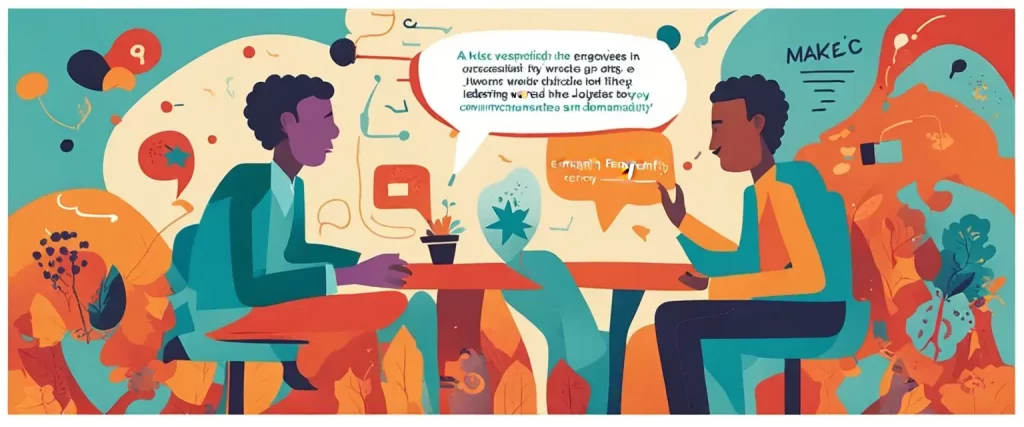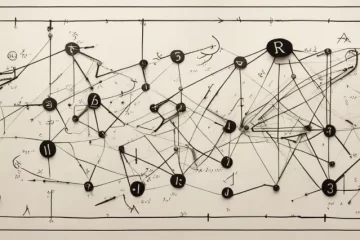Enhancing Your Communication Skills: The Power of Crucial Conversations

In today’s fast-paced and interconnected world, effective communication has become more important than ever. Whether it’s in our personal relationships or professional endeavors, our ability to engage in crucial conversations is a determining factor in achieving success and maintaining healthy connections. Drawing inspiration from the critically acclaimed book “Crucial Conversations” by Kerry Patterson, Stephen R. Covey, Joseph Grenny, this article delves into the art of effective communication, providing valuable insights and practical tips to navigate difficult discussions, bridge gaps in understanding, and build stronger relationships. Understanding the power of communication and mastering the skills needed for crucial conversations is not only a game-changer, but also a transformative force that can unlock countless opportunities for growth, connection, and overall well-being. So, come along on this enlightening journey as we explore the secrets behind transforming crucial conversations from stressful battlegrounds to heartfelt bridges of connection and understanding.
What is Communication
Communication is the process of exchanging information, ideas, and thoughts between two or more individuals or groups. It involves the use of verbal and non-verbal techniques to convey messages and establish understanding and connection. Communication can take various forms, including speaking, writing, listening, reading, and using body language and facial expressions. It plays a crucial role in human interactions, relationships, and the transfer of knowledge and meaning. Effective communication involves clear and concise expression, active listening, empathy, feedback, and adapting to different communication styles and preferences.
Why is Communication Important to Us
Communication is important to us for several reasons:
1) Understanding and being understood: Communication allows us to exchange information and ideas, ensuring that we can understand others and be understood by them. This is essential for building relationships, collaborating, and achieving common goals.
2) Building relationships: Effective communication helps us build and maintain relationships with family, friends, colleagues, and even strangers. It allows us to express our emotions, needs, and thoughts, strengthening our bonds and deepening our connections.
3) Resolving conflicts: Misunderstandings and conflicts are bound to occur in any relationship or setting. Communication plays a crucial role in resolving these conflicts by encouraging dialogue, empathy, and compromise. Good communication skills help us navigate through disagreements and find mutually beneficial solutions.
4) Sharing knowledge and ideas: Communication is the key to sharing knowledge, ideas, and information. It enables us to learn from each other, broaden our perspectives, and stimulate intellectual growth. By exchanging information, we can collectively innovate, solve problems, and progress as a society.
5) Expressing ourselves: Communication provides us with a means to express our thoughts, feelings, and opinions. It allows us to be heard, understood, and validated. Expressing ourselves authentically fosters self-confidence, self-worth, and a sense of belonging.
6) Enhancing personal and professional success: Effective communication is a fundamental skill for personal and professional success. It encompasses listening, speaking, writing, and non-verbal cues. Improved communication skills can lead to better job prospects, promotion opportunities, and stronger interpersonal relationships.
7) Promoting teamwork and collaboration: Effective communication is crucial for teamwork and collaboration in any setting, be it in the workplace, school, or community. Clear communication ensures that everyone is on the same page, working towards common objectives, and contributing their unique skills and ideas.
In summary, communication is important to us as it allows us to understand and be understood, build relationships, resolve conflicts, share knowledge and ideas, express ourselves, enhance personal and professional success, and promote teamwork and collaboration.
Unlocking Communication from Crucial Conversations

Crucial Conversations Introduction
Crucial Conversations: Tools for Talking When Stakes Are High” by Kerry Patterson, Stephen R. Covey, Joseph Grenny is a book that provides a framework and practical strategies for handling difficult conversations effectively. The authors identify crucial conversations as those high-stakes discussions that can make or break relationships, organizations, or even lives.
The book begins by highlighting the importance of mastering crucial conversations, which are moments when emotions are strong, opinions vary, and the stakes are high. It argues that these dialogues hold the key to overcoming barriers and achieving positive results in personal and professional lives.
The authors introduce a powerful model known as the “STATE” method, which stands for Share your facts, Tell your story, Ask for others’ paths, Talk tentatively, and Encourage testing. This framework facilitates open and honest communication during crucial conversations, allowing for better understanding and resolution.
Furthermore, the book discusses common conversational pitfalls, such as getting stuck in silence or violence. It offers practical techniques for transforming destructive conversations into constructive ones, even when dealing with difficult individuals or sensitive topics.
The authors also shed light on how to establish and maintain a safe environment for dialogue, where all parties feel comfortable expressing their views honestly. They emphasize the importance of creating mutual respect and trust to encourage open and productive conversations.
Throughout the book, the authors provide real-life examples and scenarios to illustrate the concepts discussed and offer actionable strategies. They cover various essential topics, including how to talk about delicate subjects, address disrespectful behavior, and reach a consensus through dialogue.
Crucial Conversations is not only a practical guide for improving communication skills, but it also addresses the emotional and psychological aspects of difficult conversations. It offers readers a comprehensive approach to navigating challenging discussions, ultimately leading to better relationships, professional growth, and effective problem-solving.
Learning Communication Methods
In the book “Crucial Conversations: Tools for Talking When Stakes Are High” by Kerry Patterson, Joseph Grenny, Ron McMillan, and Al Switzler, the authors discuss various communication methods and techniques to navigate challenging conversations. Here are some of the key methods mentioned in the book:
1. Start with the Heart: This approach emphasizes the importance of clarifying your motives and intentions before entering a crucial conversation. By examining your own feelings and focusing on a positive outcome, you can approach the conversation with a more constructive mindset.
2. Learn to Look: The authors emphasize the importance of noticing when a conversation turns crucial. Understanding key signs such as physical cues, silence, or changes in behavior can help you identify when a conversation may be veering towards high stakes.
3. Make It Safe: Creating a safe environment is essential for effective communication. This involves building mutual respect, establishing trust, and encouraging open dialogue where all parties feel comfortable expressing their thoughts and feelings without fear of negative consequences.
4. Master Your Stories: The authors highlight the importance of challenging and reframing your assumptions, judgments, and interpretations of a situation. By examining the stories we tell ourselves, we can reduce defensiveness and become more open to alternative perspectives.
5. STATE Your Path: STATE is an acronym that stands for Share your facts, Tell your story, Ask for other’s paths, Talk tentatively, and Encourage testing. This method provides a structured approach to addressing crucial conversations, helping individuals express themselves effectively while promoting dialogue and understanding.
6. Explore Others’ Paths: This technique encourages active listening and understanding others’ viewpoints. By genuinely seeking to understand another person’s perspective and asking open-ended questions, you can increase mutual understanding and find common ground.
7. Make It Motivating: The authors emphasize the importance of identifying shared goals and values to keep conversations focused on positive outcomes. By creating a motivating and mutually beneficial scenario, you can encourage cooperation rather than resistance.
8. Agree on a Mutual Purpose: Establishing a shared purpose or goal helps align stakeholders and facilitates cooperation. Finding common ground and focusing on a shared vision create an environment that fosters effective communication and collaboration.
9. Sympathize Without Agreeing: Acknowledging and validating others’ emotions and experiences, even if you don’t fully agree, can help build trust and maintain a productive conversation. Sympathy enables understanding and paves the way for finding common ground.
10. Apologize When Needed: Recognizing and taking responsibility for your role in a disagreement is crucial. Offering a sincere apology demonstrates humility and a commitment to resolving the issue, which increases the chances of a positive outcome.
These are just some of the communication methods and techniques discussed in “Crucial Conversations.” The book provides a comprehensive framework for handling challenging conversations effectively.
Crucial Conversations Quotes
Crucial Conversations quotes as follows:
1. “Our best chance of building healthy relationships is to use crucial conversations to talk honestly about what really matters.”
2. “If you can’t talk the issues through, then you’ll have to live with them or fail with them.”
3. “Silence kills. Crucial conversations are the key to connection and growth.”
4. “When we feel threatened or judged, we often resort to either silence or violence. It takes skill and practice to stay in dialogue when those instincts kick in.”
5. “Speaking up about violated expectations is crucial for building trust and resolving conflict.”
6. “Dialogue, when it works best, is a stream of shared meaning.”
7. “Making it safe for others to talk about almost anything is the hallmark of personal and professional success.”
8. “The most effective leaders know how to balance candor with respect and empathy in crucial conversations.”
9. “The most dangerous conversations are often the ones we avoid having.”
10. “Crucial conversations provide an opportunity to learn, grow, and connect on a deeper level.”

More Books About Crucial Conversations by Kerry Patterson, Stephen R. Covey, Joseph Grenny
1. Rebel Ideas: The Power of Diverse Thinking” by Matthew Syed
In “Rebel Ideas,” Matthew Syed demonstrates how diversity and divergent perspectives contribute to innovative thinking and problem-solving. This book complements the concepts explored in “Crucial Conversations” by emphasizing the importance of considering various viewpoints during discussions. Syed’s engaging storytelling and evidence-based research make this an insightful read for anyone looking to enhance their communication skills.
2. Talk Like TED: The 9 Public-Speaking Secrets of the World’s Top Minds” by Carmine Gallo
Carmine Gallo’s “Talk Like TED” offers a captivating exploration of public speaking and presentation skills. While “Crucial Conversations” focuses on interpersonal dialogue, Gallo’s book delves into effective communication on a larger scale. It reveals the techniques used by TED speakers to captivate audiences and inspire action, providing valuable insights into powerful communication methods that can be adapted to crucial conversations in any setting.
3. “How to Talk to Anyone: 92 Little Tricks for Big Success in Relationships” by Leil Lowndes
If you desire to improve your conversational skills, “How to Talk to Anyone” by Leil Lowndes is an excellent choice. This book offers practical advice to enrich your communication abilities, covering topics such as building rapport, mastering non-verbal cues, and overcoming communication barriers. By applying Lowndes’ tips, you can enhance your confidence and influence in crucial conversations, ultimately yielding better outcomes.
4. Difficult Conversations: How to Discuss What Matters Most” by Douglas Stone, Bruce Patton, and Sheila Heen
Complement your understanding of crucial conversations with “Difficult Conversations” by Douglas Stone, Bruce Patton, and Sheila Heen. This book equips readers with skills to navigate tough discussions. It provides invaluable guidance on maintaining constructive dialogue and resolving conflicts effectively. By combining the principles from both books, you will develop a thorough toolkit for mastering even the most challenging conversations.
5. Influencer: The Power to Change Anything” by Kerry Patterson, Joseph Grenny, David Maxfield, Ron McMillan, and Al Switzler
Although not exclusively about conversations, “Influencer” by Kerry Patterson, Joseph Grenny, David Maxfield, Ron McMillan, and Al Switzler explores how to drive change through effective communication strategies. Drawing from extensive research, the authors provide practical tools to influence behavior and inspire others to act. By incorporating the principles from “Crucial Conversations” with the insights gleaned from “Influencer,” you’ll gain a comprehensive understanding of impactful communication and change management.
These five books together address various aspects of effective and impactful communication, covering vital skills from crucial conversations to public-speaking techniques, conversational prowess, resolving conflicts, and inspiring behavioral change. By reading and applying the lessons from each of these books, you can enhance your ability to communicate effectively in any context.



0 Comments